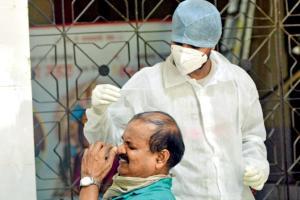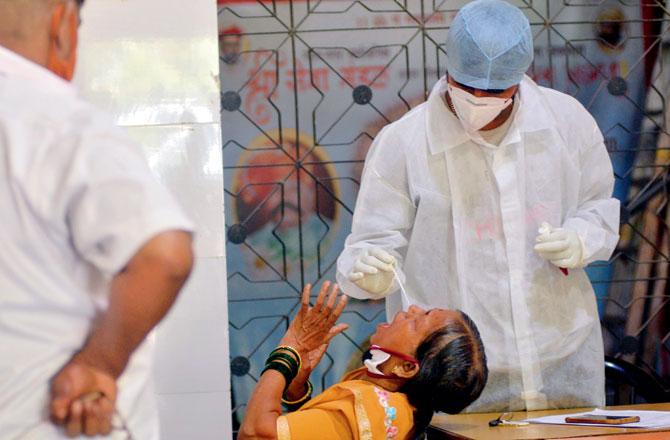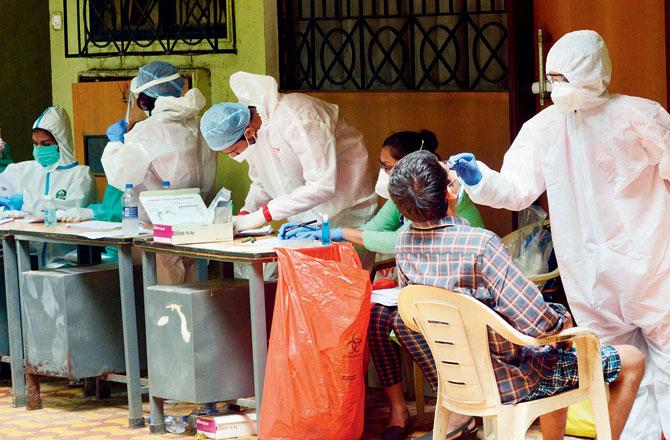
BMC doctors and health workers conduct a swab test for COVID-19 at Ganesh hall, Nehru Nagar, on Tuesday. Pics/Sayyed Sameer Abedi
As COVID-19 cases are increasing in the state and country, health experts say with winter setting in, the number might increase further, especially since upper and lower respiratory tract infections are also on the rise. They warn that doctors must be extra vigilant to distinguish between winter-related ailments and COVID-19.
"A sudden increase in the number of new COVID cases are evidence of community transmission, that has now reached the full-blown phase", said Dr Subhash Hira, professor of Global Health at the University of Washington-Seattle, USA, and health advisor to several Indian and African health agencies. "Some anecdotal cases of reinfection that are reported from Bengaluru, and are being labelled by some in the media as the second wave of the COVID-19 pandemic, is not correct scientific terminology," he said.
ADVERTISEMENT

"With winter about to set in the northern hemisphere, Dr Antony Fauci of NIH and Dr Robert Redfield of CDC, Atlanta, the USA, have warned of a double-whammy this year wherein existing COVID cases will be joined by winter influenzas and other viral infections. These co-infections will raise newer treatment challenges for doctors and hospitals. That is further likely to strain the overburdened health systems in the US/Canada and Europe," Dr Hira said. Indian winters may pose a similar challenge, especially in the northern states.
Also Read: All you need to know about Russia's COVID-19 vaccine Sputnik V
Dr Wiqar Shaikh, senior allergy and asthma specialist said, "There is always a steep increase in certain ailments with the onset of winter, where the temperature drops, these include influenza, asthma and bronchitis pneumonia (viral and bacterial), streptococcal sore throat, heart attacks etc. Viral infections are known to increase with a change in temperature. The moment there is fluctuation in temperature in a given geographical area, organisms, particularly viruses, enter these areas."

Residents of Vini Garden complex get tested for COVID-19 at Mandapeshwar road, Borivli on Monday. Pic/Satej Shinde
'Important to distinguish'
With a drop in temperature, usually, we see an increase in influenza virus spread, which would result in fever, cough, cold, breathlessness, etc. and these need to be treated with symptomatic and supportive treatment. In such cases, it is crucial, in the current situation, to distinguish between, an influenza infection and COVID-19. Also, there are high chances of human error, of testing the samples at designated laboratories, whose technicians will have to be extra vigilant, while checking samples for routine influenza virus vs COVID-19, as there are symptoms which are similar, pointed Dr Shaikh.
Dr Shaikh, further added, that during winter, with a sudden dip in temperature, the entry of cold air into the lungs may trigger an attack of asthma or bronchitis. "Such patients need to be careful and should be instructed to step up the dose of their inhaled medications and should consult their physicians, if there is any aggravation of breathlessness. Patients who have cough, fever, or breathing issues, or chest pain in which chances of pneumonia are high, particularly in patients with other comorbidities such as blood pressure, diabetes, etc. should seek immediate medical aid," he said.
Also Read: COVID-19: Civic workers disinfect public places across the world as countries ease restrictions
Advice for general practitioners
Shaikh has some advice to general practitioners practising in government, civic and private hospitals, stating that they need to be extra vigilant during the winter, to distinguish between winter related ailments and COVID-19.
Shaikh added, "During the monsoon, we had witnessed a steep rise in cases of malaria, dengue, leptospirosis, typhoid, jaundice and diarrhoea. Interestingly, this season, we have not seen many cases of chikungunya and swine flu. Though there is a definite increase in the number of COVID-19 cases in the past few weeks and the possibility of a second wave of the virus, with the onset of winter, this might turn out to be a challenge in the absence of medicine and a vaccine. The only solution therefore for COVID-19 is the development of herd immunity, which we feel will come in sooner or later."
Towards herd immunity'
Dr Ketan Vagholkar, professor of Surgery, DY Patil Medical College said, "With the advent of winter, seasonal febrile disorders such as flu, common cold, and many other fevers are known to increase. Taking into consideration the seriousness of COVID-19, it is important that doctors consider it as the primary cause for febrile illness. There is also a high likelihood that COVID-19 could still exist despite a negative swab. Therefore patient education is of utmost importance, to prevent delay in diagnosis, especially of COVID-19."
Dr Vagholkar added, "It is advisable for every citizen to report to primary care physicians immediately, as soon as they experience even the mildest of symptoms. With the unlocking process, there is a likelihood of a mild spike, in cases, of COVID. These should not be confused with the usual, seasonal flu-like diseases, typically seen during winter. The positive effect is that more and more asymptomatic patients are being tested to be positive. This is a slow progression towards herd immunity, though the numbers are small, considering the average population of cities in our country."
Speaking to mid-day, Dr Fazal Nabi, director of the paediatric department, Jaslok Hospital, said, "We have seen a steep rise in cases of malaria this season in the paediatric age group, which otherwise was under control in the past three years. Also cases of dengue, though not many so far, may be triggered in coming months. With winter coming, there will be a spike in cases of respiratory infections. It is of utmost importance to educate parents to understand the basic difference between common viral symptoms and COVID-19 symptoms."
Identifying COVID-19 symptoms in kids
1) In case of a common viral cold, the child may have a runny nose and throat congestion. In case of COVID-19 the child has a dry nose or dry cough.
2) In case of viral fever the child may have high fever on day one and subsequently the fever may come down to normal on day two and three. In case of COVID-19 the fever may or may not exist.
3) In case of normal viral fever, the body ache comes in the initial days, while in case of COVID-19, the body ache may persist even without fever.
4) In case of viral fever, the child is absolutely fine within three to four days of treatment. However in case of COVID-19, after a week to 10 days of treatment, in some cases there are chances of developing post COVID multisystem inflammatory, wherein the child develops fever, skin rashes or redness of skin etc, which can be treated.
The positive effect is that more and more asymptomatic patients are being tested and turning out to be positive. This is a slow progression towards herd immunity, though the numbers are small, considering the average population of cities in our country'
Dr Ketan Vagholkar, professor of Surgery, DY Patil Medical College
Patients who have cough, fever, breathing issues, or chest pain in which chances of pneumonia are high, particularly those with comorbidities such as blood pressure, diabetes, etc. should seek immediate medical aid
Dr Wiqar Shaikh, senior allergy and asthma specialist
'A sudden increase in the number of new COVID cases is evidence of community transmission, that has now reached the full-blown phase'
Dr Subhash Hira, University of Washington-Seattle
'With winter coming, there will be a spike in respiratory infections. It is of utmost importance to especially educate parents to understand the basic difference between common viral symptoms and COVID-19 symptoms'
Dr Fazal Nabi, Jaslok Hospital
Keep scrolling to read more news
Catch up on all the latest Mumbai news, crime news, current affairs, and a complete guide from food to things to do and events across Mumbai. Also download the new mid-day Android and iOS apps to get latest updates.
Mid-Day is now on Telegram. Click here to join our channel (@middayinfomedialtd) and stay updated with the latest news
 Subscribe today by clicking the link and stay updated with the latest news!" Click here!
Subscribe today by clicking the link and stay updated with the latest news!" Click here!







